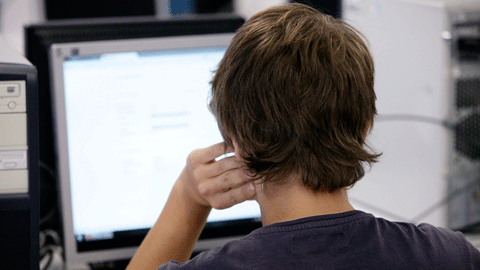Confinement increases educational inequalities among children

The study "Confinament i condicions d'aprenentatge"conducted by lecturers of the UAB Department of Sociology Sheila González and Xavier Bonal, with data from 35,937 families and 59,167 children aged 3 to 18 at the beginning of the lockdown, detects an increase in learning inequalities which already existed, but have now been exacerbated. The study analyses factors such as digital gaps, school learning processes, assessment by the school, learning support, family activities and extracurricular activities.
06/05/2020
Sixty percent of families consider that the school has reacted in an efficient and coordinated manner. Negative assessments such as late, unplanned, unequal reactions or lack of contact) make up for 26.8% of all answers.
The analysis conducted by Sheila González and Xavier Bonal was dones through a questionnaire, during the first two weeks in which the state of alarm was in force. The study analyses data from 35,937 families and 59,167 children aged 3 to 18.
After assessing formal and informal learning and extra-curricular activities, an increase in inequalities can be seen and, albeit already existing before lockdown, are now exacerbated by the current situation.
According to researchers Xavier Bonal and Sheila González, "during the first weeks of confinement we observed an accumulation of educational inequalities". The distances among pupils "exist both in formal learning contexts (due to digital gaps, but also because of unequal responses of the schools) and in informal contexts (intensity and types of activities that children and teenagers dedicate their time to) and extracurricular areas (children in families with greater education levels were involved in more activities before confinement and have maintained these to a greater extent than those with lower training levels)".
Digital gap
Access to technology depends on family income. Access to devices is positively related to the hours dedicated to school work.
Academic learning
Researchers created an indicator of academic learning opportunities during lockdown, the index OTL (Opportunities To Learn), formed by the variables of the questionnaire referring to school work during confinement, online communication with teachers, the reception of e-mails, homework and projects to be evaluated. In two weeks of confinement, private schools reacted more intensely than public schools in terms of school tasks and interaction with pupils. The OTL averages per sector were clearly different between public, private and semi-private schools.
Assessment of schools
With regard to the global assessment of schools and their reaction during the state of alarm, the majority of families consier that the school reacted quickly and in a coordinated manner when classes were suspended. A total of 60% of the families considers that the school had reactly efficiently and in coordination. Negative assessments (late, unplanned, unequal reaction or lack of contact) were mentioned by 26.8% of participants.
Learning support
The role families play in academic accompaniment evolves with the age of the child. Thus, while a great majority (79%) of mothers state that they regularly or often help their children, percentages go down to 43% among mothers with children in secondary education and 22% in upper secondary courses. In the case of fathers, percentages are markedly lower in all age ranges (45% total, only 22% with secondary school children and 12% in upper secondary).
Family activities
The data demonstrates that children and teenagers dedicate time to different activities depending on the education level of the parents. There is a higher and more intense level of informal learning (with a greater number of activities daily and weekly) among children and teenagers of knowledgeable parents.
In the case of families with children aged 0 to 6, there are three activities in which social differences stand out in favour of those with more economic and cultural levels, which are: accompaniment in reading (59% of families with university studies state that children aged 3 to 8 read with the help of an adult every day, versus 37% of those with compulsory schooling), language studies (44% of families with university studies respond that they practice languages every day or several days a week in contrast to 36% among families with compulsory studies) and sports activities (81% of university families state that their children do sports several times a week versus 66% of those with compulsory studies).
Extracurricular activities
A total of 70% of the extracurricular activities are not being followed during the quarantine. This percentage varies greatly according to the types of activities: sports has fallen 87%, traditional and cultural activities have fallen 89% and scouting activities, 77%. In contrast, musical activities continue at 63%, and language activities at 61%.
Economic situation
The study points out that before confinement, 13% of participants were unemployed (with or without benefits), while at the moment the questionnaire was sent out, the percentage reached 23% of participants (of these, 60% were affected by a temporary layoff procedure). Only 21.5% were working "as usual". The rest were working from home, with the same time schedule or a more flexible timetable (the majority, 39%). And 17% of those still working considered it probable that they would lose their job. Of those unemployed, 50% know that they are eligible to receive unemployment benefits, while the other half either knows they are not eligible or are not sure.